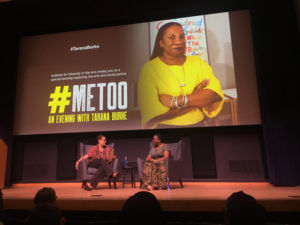In a conversation in Cubberley Auditorium Tuesday evening, civil rights activist Tarana Burke discussed her activism regarding sexual assault, her experience with abuse and her path to healing as a survivor. One of Time Magazine’s 100 most influential people, she coined the phrase “Me Too” in 2006 to raise awareness of the pervasiveness of sexual assault.
Burke discussed Me Too’s development into a broader movement following the 2016 use of #MeToo as a hashtag. She shared that her work to interrupt sexual violence was not only a quest for social justice, but also a personal path to healing.

Burke spoke in conversation with Alisa Bierria Ph.D ’16, a postdoctoral fellow at the University of California, Berkeley’s department of Gender & Women’s Studies. The event was part of the Institute for Diversity in the Arts’ (IDA) spring course, “Art + Community: Division, Resilience and Reconciliation” and was co-sponsored by Feminist, Gender and Sexuality Studies, The Markaz, African & African American Studies, the Asian American Activities Center, Stanford Arts, the Women’s Community Center and the Black Community Services Center.
A-lan Holt ’11, associate director of IDA, opened the conversation by reflecting on the event’s aim to “sustain community, especially in times of tension and polarization.” She then introduced Burke, who entered the room to a standing ovation.
Bierria praised Burke’s intentionality in her mission to prevent sexual assault and create a network of support for survivors, especially for low-income women of color.
Burke’s fight for social justice began years before the beginning of the Me Too movement. She shared that her personal experiences with sexual abuse inspired her to become an activist.
“I am a survivor of sexual violence… and I’m an organizer,” Burke said. “I had figured out how to survive, how to cope, early on.”
In 1996, Burke worked at a youth camp predominantly attended by children of color. There, Burke recalled that a young girl confessed her own experience with sexual abuse to Burke, who struggled to come up with a response.
“I didn’t have anything to give her… I was young and I was struggling with what healing meant for myself,” Burke said. “I didn’t want to mess up. I didn’t want to say the wrong thing to her. And I ended up not saying anything. It was when she walked away from me that I realized that what I wanted to say to her was, ‘That happened to me, too.’”
That moment was the spark that motivated Burke to embark on a mission to raise awareness and prevent sexual abuse in society. Burke vowed to always have a response for any girl who had the courage to share her story.
Burke found support and solace in her activism.
“I always explain the work of the Me Too movement as individual healing and community healing,” Burke said.
While Burke believes that survivors of sexual abuse are the ones who are most capable of finding solutions to ending sexual violence, she emphasizes the importance of also prioritizing personal healing.
“I think it’s unfair to ask people to permit themselves to the fight to end sexual violence without also committing resources to helping them heal,” Burke said. “We need healing and wholeness the same way we need food, clothes and shelter.”
Burke criticized the classist view of the way society today treats healing and therapy, saying that people falsely assume that healing can only take place in professional spaces, such as a therapist’s office.
While Burke created the Me Too movement to shed light on the plight of black women and girls, she emphasized that a social justice movement that centers around a marginalized group is not to the exclusion of anybody else.
“The reality is that Me Too’s origins are for black and brown girls, but it’s in line with our work to serve all survivors,” Burke added. “When the person with the least in the room has everything they need, then you know you’ve done something right.”
Bierria agreed, saying that the Me Too movement is “not about uniformity, but about coalition among survivors.”
Burke is currently laying the groundwork for the future of the movement. Because the movement went viral online, Burke said she hopes to create a space for it to survive online beyond its status as a hashtag. She shared her plans to scale up the work of the movement, increasing accessibility by developing an online community.
“The work of Me Too is not about Me Too. It is about what happens after you say Me Too,” Burke said.
Above all, Burke credits her ability to document her joy as the key component in her recovery.
“What saved me and what keeps me sane is that I’ve learned how to curate joy in my life,” Burke said. “You owe yourself joy. You owe yourself survival.”
If you have experienced sexual abuse, visit notalone.stanford.edu for more resources.
Contact Alex Tsai at aotsai ‘at’ stanford.edu.
